When seeking therapy chickens for mental health support, you'll find several breeds that excel in providing comfort and companionship. Silkies, Buff Orpingtons, and Brahmas are known for their gentle nature and soft, fluffy appearance. Sussex, Cochins, and Australorps offer calm demeanors and easy handling. Wyandottes and Easter Eggers bring visual appeal with their colorful plumage and eggs. Rhode Island Reds provide confidence and engaging personalities. These breeds share traits like docility, adaptability, and soothing presence, making them ideal for emotional support. Each chicken has unique qualities that can benefit different individuals, so exploring their specific characteristics can help you find the perfect feathered companion.
Silkie Chickens

Why are Silkie chickens gaining popularity as therapy animals? These unique birds offer a combination of visual appeal and gentle temperament that makes them ideal for emotional support. With their fluffy, silk-like plumage and docile nature, Silkies provide a soothing presence that can help reduce stress and anxiety.
You'll find that Silkies are particularly well-suited for therapy work due to their calm demeanor and tolerance for handling. They're less likely to startle or become agitated, making them safe for interactions with individuals of all ages and abilities.
Their soft feathers invite touch, which can be therapeutic for those seeking sensory stimulation or comfort. Silkies' distinctive appearance, with their pom-pom-like crests and feathered feet, often elicits smiles and curiosity, helping to break the ice in therapy sessions.
They're also relatively small, making them manageable in various settings. Their quiet nature is another plus, as they're less likely to disturb others with loud vocalizations.
When considering therapy chickens, you'll find that Silkies' combination of aesthetic charm and gentle disposition makes them an excellent choice for promoting mental well-being.
Buff Orpingtons
You'll find Buff Orpingtons to be excellent therapy chickens due to their gentle and calm temperament.
Their fluffy, cuddly appearance makes them irresistible to those seeking comfort and emotional support.
You'll appreciate how easy they're to handle, making them ideal for individuals who may be anxious or hesitant around animals.
Gentle and Calm Temperament
When it comes to therapy chickens, Buff Orpingtons stand out for their exceptionally gentle and calm temperament. You'll find these birds to be docile and easy-going, making them ideal companions for individuals seeking emotional support. Their placid nature allows them to remain composed in various situations, reducing stress for both the chicken and the person interacting with it.
Buff Orpingtons are known for their patience, which is essential when working with people who may have varying levels of comfort around animals. You can expect these chickens to tolerate handling and petting without becoming agitated. Their gentle demeanor makes them particularly suitable for children, the elderly, or those with limited mobility.
These birds also exhibit a curious and friendly disposition, often approaching people willingly. This trait encourages positive interactions and can help build confidence in individuals who may be hesitant around animals. The Buff Orpington's calm presence can have a soothing effect, potentially lowering anxiety and promoting relaxation.
Their predictable behavior and non-aggressive tendencies minimize the risk of sudden movements or pecking, ensuring a safe and comfortable experience for those seeking animal-assisted therapy. This reliability makes Buff Orpingtons an excellent choice for consistent, long-term mental health support.
Fluffy, Cuddly Appearance
Sporting a plush, feathery coat, Buff Orpingtons are often described as the teddy bears of the chicken world. Their soft, fluffy appearance makes them irresistibly huggable and perfect for therapy purposes. You'll find their golden-buff feathers inviting to touch, providing a soothing tactile experience for those seeking comfort.
The Buff Orpington's rounded body shape adds to their cuddly appeal. Their full-bodied silhouette, combined with their fluffy plumage, creates a comforting presence that can help reduce anxiety and stress. When you hold a Buff Orpington, you'll notice how their warmth and softness can be incredibly calming.
These chickens' fluffy feathers also serve a practical purpose in therapy settings. Their plush appearance makes them less intimidating to individuals who may be hesitant around animals. The Buff Orpington's cuddly look can help break down barriers and encourage interaction, even with those who are initially apprehensive.
Their charming, stuffed-animal-like appearance isn't just for show. It contributes greatly to their effectiveness as therapy animals, making them a top choice for mental health support programs that incorporate animal-assisted therapy.
Easy to Handle
Beyond their adorable appearance, Buff Orpingtons are prized for their docile nature and ease of handling. You'll find these chickens to be exceptionally calm and friendly, making them ideal for therapy work. Their gentle temperament allows for easy interaction, even with individuals who may be nervous around animals.
Buff Orpingtons' large size and slow movements contribute to their manageability. You won't have to worry about sudden, startling movements that could upset therapy participants. These chickens are known for their willingness to be held and petted, which is essential for providing comfort and support in therapeutic settings.
When working with Buff Orpingtons as therapy chickens, you'll appreciate:
- Their patience during handling sessions
- Their ability to remain calm in various environments
- Their tendency to form strong bonds with humans
You'll find that Buff Orpingtons adapt well to different therapy scenarios, whether it's one-on-one sessions or group activities. Their easy-going nature makes them suitable for a wide range of clients, from children to the elderly.
With proper socialization and handling, these chickens can become reliable and effective therapy animals, providing comfort and support to those in need.
Brahmas
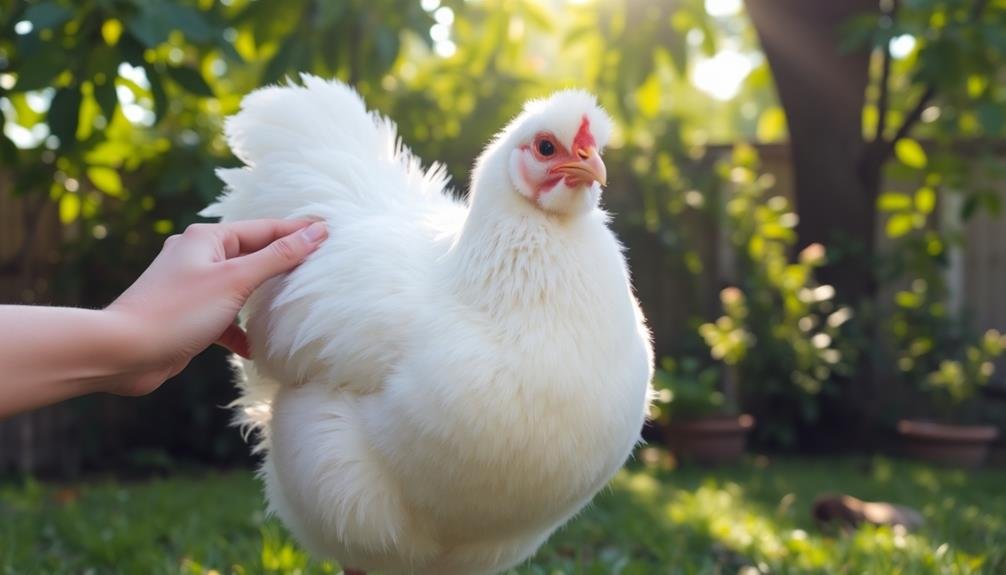
If you're looking for a gentle giant in the world of therapy chickens, Brahmas might be your perfect match.
These large, docile birds are often called "the king of chickens" due to their impressive size and regal appearance.
You'll find Brahmas to be exceptionally cuddly and calm, making them ideal companions for those seeking comfort and emotional support.
Gentle Giants
Among the various chicken breeds used for therapy, Brahmas stand out as the gentle giants of the poultry world. These large, docile birds are known for their calm demeanor and friendly disposition, making them ideal companions for those seeking emotional support.
You'll find that Brahmas are exceptionally patient and tolerant, which is essential when working with individuals who may have anxiety or other mental health challenges.
Brahmas' size can be both impressive and comforting. Their fluffy feathers and substantial build make them perfect for cuddling, providing a sense of security to those who interact with them.
You'll appreciate their slow, deliberate movements, which can have a calming effect on people experiencing stress or agitation.
When considering Brahmas for therapy, keep in mind their unique qualities:
- Exceptional temperament: They're known for being quiet and easy-going
- Impressive size: Their large stature can be both awe-inspiring and comforting
- Cold-hardy: They adapt well to various climates, making them versatile therapy animals
You'll find that Brahmas' gentle nature and striking appearance make them excellent therapy chickens, capable of providing comfort and support to those in need of mental health assistance.
Docile and Cuddly
When you interact with Brahma chickens, you'll quickly understand why they're often described as "docile and cuddly." These gentle giants excel in therapy settings due to their calm nature and willingness to be held. Their large size and fluffy feathers make them perfect for petting and hugging, providing a comforting experience for those seeking emotional support.
Brahmas are known for their patience and tolerance, making them ideal for individuals who may be anxious or inexperienced with animals. You'll find that these chickens are content to sit quietly in your lap or next to you, offering a soothing presence without demanding too much attention.
To help you visualize the Brahma's therapeutic qualities, consider the following characteristics:
| Physical Traits | Behavioral Traits |
|---|---|
| Fluffy feathers | Calm demeanor |
| Large size | Patient |
| Soft plumage | Tolerant |
| Feathered feet | Quiet |
| Round body | Affectionate |
These traits combine to create a chicken breed that's not only visually appealing but also emotionally supportive. Whether you're dealing with stress, anxiety, or depression, spending time with a Brahma can provide a sense of peace and comfort, making them an excellent choice for therapy animals.
Sussex Chickens
Sussex chickens stand out as excellent therapy birds due to their gentle nature and striking appearance. These birds are known for their calm demeanor and friendly disposition, making them ideal companions for those seeking emotional support.
You'll find that Sussex chickens are easy to handle and enjoy human interaction, which is essential for therapeutic purposes. The Sussex breed comes in various color varieties, with the Speckled Sussex being particularly popular. Their unique plumage pattern can be visually stimulating and engaging for individuals struggling with mental health issues.
You'll appreciate how these birds can provide a soothing presence while also offering visual interest. When considering Sussex chickens for therapy, keep in mind their key benefits:
- Docile temperament, making them suitable for all age groups
- Excellent foragers, providing entertaining outdoor activities
- Cold-hardy birds, adaptable to various climates
Sussex chickens are also known for their consistent egg-laying abilities, which can offer a sense of purpose and routine for those caring for them. Their manageable size makes them suitable for both urban and rural settings, allowing for easy integration into various therapy programs.
You'll find that Sussex chickens can considerably contribute to improving mental well-being through their calming presence and interactive nature.
Cochins

Another excellent choice for therapy chickens, Cochins are known for their gentle and docile nature.
These fluffy birds are easily recognizable by their distinctive feathered feet and legs, giving them a unique appearance that many find endearing. Cochins come in various colors, including buff, black, white, and blue, allowing you to choose a variety that suits your preferences.
You'll find that Cochins are exceptionally calm and tolerant of handling, making them ideal for therapeutic interactions. Their large size and soft, fluffy plumage make them comfortable to hold and pet, which can be soothing for individuals seeking comfort.
Cochins are also known for their quiet demeanor, rarely making loud noises that could startle or disrupt therapy sessions.
These chickens are adaptable to different environments and can thrive in both spacious outdoor areas and smaller, confined spaces. This flexibility makes them suitable for various therapeutic settings.
Cochins are also known for their broodiness, which can be beneficial in some therapy situations where nurturing behaviors are desired. Their gentle temperament and patience make them excellent companions for people of all ages, including children and the elderly.
Polish Chickens
Charm and whimsy define the Polish chicken breed, making them a delightful choice for therapy animals. Their distinctive crest of feathers atop their heads gives them a comical, almost cartoonish appearance that's sure to bring a smile to anyone's face.
You'll find these birds to be gentle and docile, making them ideal for interacting with people who may be anxious or easily startled.
Polish chickens come in various colors and patterns, adding visual interest to your therapy flock. They're known for their friendly and curious nature, often approaching humans with interest rather than fear. This breed's calm demeanor makes them excellent companions for individuals seeking emotional support.
When considering Polish chickens for therapy work, keep these key points in mind:
- Their unique appearance can spark joy and conversation
- Their gentle temperament suits various therapy settings
- They're adaptable to different environments, from indoor spaces to outdoor gardens
While Polish chickens aren't the largest breed, their striking looks and amiable personalities more than make up for their size.
You'll find that these birds can form strong bonds with their human caretakers, providing consistent emotional support to those in need.
Australorps
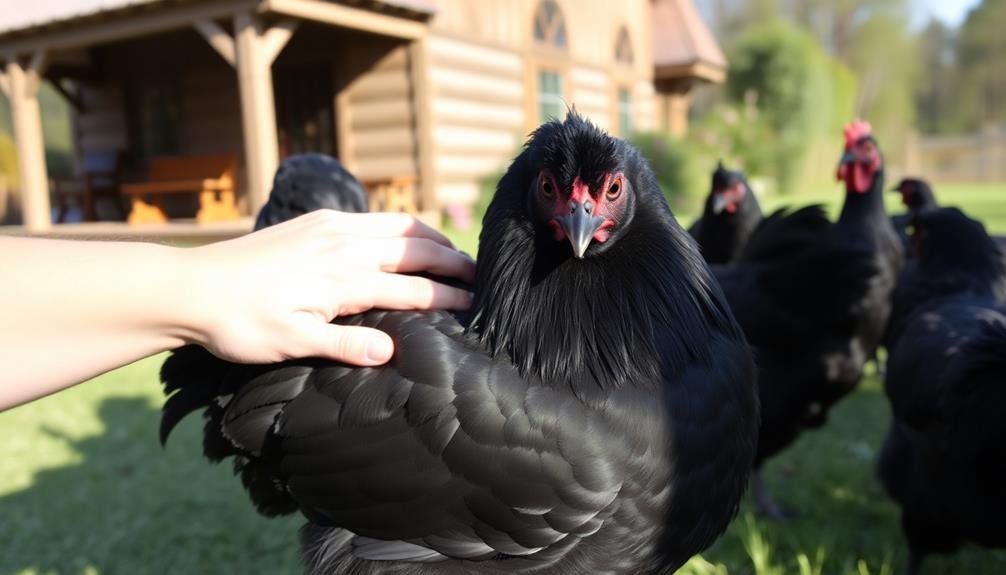
You'll find Australorps to be excellent therapy chickens due to their gentle and calm demeanor.
These birds are known for their docile nature, making them easy to handle and interact with during mental health support sessions.
Additionally, Australorps are prolific egg layers, which can provide a sense of purpose and accomplishment for those caring for them as part of their therapy.
Gentle and Calm Demeanor
Serenity emanates from Australorp chickens, making them ideal therapy animals for mental health support. Their gentle and calm demeanor sets them apart from other breeds, offering a soothing presence to those struggling with anxiety, depression, or stress.
You'll find that Australorps are naturally docile and easy to handle, making them perfect companions for individuals of all ages and abilities.
These chickens' temperament is particularly beneficial for therapy sessions, as they're unlikely to startle or become agitated. You can expect Australorps to remain composed even in new environments, which is essential when working with individuals who may be sensitive to sudden movements or loud noises.
Their tranquil nature allows you to focus on the therapeutic benefits of animal interaction without worrying about unpredictable behavior.
Australorps' gentle demeanor contributes to mental health support in several ways:
- Reduces anxiety by providing a calming presence
- Encourages mindfulness through quiet observation and interaction
- Promotes emotional connection without overwhelming the individual
Excellent Egg Production
While Australorps excel as therapy chickens due to their calm nature, they're also prized for their impressive egg-laying capabilities. You'll find these birds consistently produce large, brown eggs throughout the year, often laying up to 250-300 eggs annually. This high production rate guarantees a steady supply of fresh eggs for your household or therapy program.
Australorps' egg-laying prowess doesn't diminish their therapeutic value. In fact, it enhances it. Collecting eggs can be a rewarding and calming activity for individuals struggling with mental health issues. The act of gathering eggs provides a sense of purpose and accomplishment, boosting self-esteem and promoting a connection with nature.
You'll appreciate that Australorps maintain their egg production even in colder climates, making them suitable for various regions. Their ability to lay eggs year-round also means you won't have to worry about seasonal fluctuations in your therapy program.
Additionally, the nutritional benefits of fresh eggs can contribute to improved physical health, complementing the mental health support these chickens provide. By choosing Australorps, you're not only gaining excellent therapy animals but also guaranteeing a sustainable source of nutritious food.
Wyandottes
Wyandottes' gentle nature and striking appearance make them excellent therapy chickens. These birds are known for their calm demeanor and friendly disposition, making them ideal companions for those seeking emotional support.
You'll find that Wyandottes are easy to handle and enjoy human interaction, which is essential for therapy animals. Their distinctive laced feather pattern and variety of color combinations add visual appeal, which can be soothing and enchanting for patients.
Wyandottes are also hardy birds that adapt well to different environments, making them suitable for various therapy settings.
Here are three key reasons why Wyandottes excel as therapy chickens:
- Docile temperament: They're patient and tolerant, allowing for gentle petting and cuddling.
- Impressive appearance: Their unique feather patterns provide visual stimulation and interest.
- Intelligence: Wyandottes can learn simple tricks, engaging patients in interactive activities.
You'll appreciate that these chickens are also relatively quiet, making them suitable for indoor therapy sessions. Their medium size allows for easy handling by most individuals, including children and the elderly.
With proper socialization, Wyandottes can become affectionate and form strong bonds with their human caregivers, enhancing their effectiveness as therapy animals.
Easter Eggers

Easter Eggers offer a delightful twist to the world of therapy chickens. These unique birds are known for their colorful eggs, ranging from blue to green to pink, which can instantly brighten anyone's day.
You'll find that Easter Eggers have friendly personalities and are generally calm, making them excellent companions for those seeking emotional support.
Their curious nature encourages interaction, which can be particularly beneficial for individuals struggling with depression or anxiety. You'll notice that Easter Eggers are often keen to explore their surroundings, providing a gentle distraction and promoting mindfulness in their human companions.
Their soft feathers and docile demeanor make them ideal for petting therapy sessions.
Easter Eggers are also relatively low-maintenance, which can be advantageous for those who may find caring for more demanding animals overwhelming. You'll appreciate their hardiness and adaptability to various climates.
Their diverse appearances, with no two birds looking exactly alike, can spark conversations and interest, helping to combat feelings of isolation.
Rhode Island Reds
Rhode Island Reds bring a different set of qualities to the therapy chicken arena. These robust, reddish-brown birds are known for their confident and friendly personalities, making them excellent companions for those seeking mental health support.
You'll find that Rhode Island Reds are calm and easy to handle, which is particularly beneficial for individuals who may be anxious or stressed. These chickens are intelligent and curious, often engaging in interactive behaviors that can help distract and uplift those struggling with mental health issues.
Their consistent egg-laying ability also provides a sense of routine and accomplishment for their caretakers. You'll appreciate their hardiness and adaptability to various climates, making them suitable therapy chickens for different environments.
Here are three key benefits of Rhode Island Reds as therapy chickens:
- Their bold personalities encourage confidence in handlers
- Their intelligence promotes engaging interactions
- Their reliable egg production offers a sense of purpose
While not as colorful as some other breeds, Rhode Island Reds' striking appearance and warm coloration can still be visually appealing and soothing.
Their gentle clucking sounds can also provide a calming auditory experience for those seeking comfort and relaxation.
Frequently Asked Questions
How Do I Train a Chicken to Be a Therapy Animal?
To train a therapy chicken, you'll need patience and consistency. Start with basic commands, socialize your bird, and expose it to various environments. Use positive reinforcement and handle it gently. Gradually introduce stimuli it might encounter during therapy sessions.
Are Therapy Chickens Allowed in Hospitals or Nursing Homes?
You'll find that therapy chickens aren't typically allowed in hospitals or nursing homes. However, policies vary by facility. It's best to check with the specific institution, as some may permit them with proper certification and health clearances.
What Legal Requirements Exist for Owning Therapy Chickens?
You'll need to check local zoning laws and health codes for keeping chickens. There's no specific "therapy chicken" certification, but you should guarantee your birds are healthy and well-behaved. Consider liability insurance for added protection.
How Often Should Therapy Chickens Interact With Patients?
You should schedule therapy chicken sessions based on your patients' needs. Typically, you'll want to aim for 2-3 interactions per week, lasting 30-60 minutes each. However, you can adjust the frequency and duration as necessary for best results.
Can Therapy Chickens Help With Specific Mental Health Conditions?
Yes, therapy chickens can help with various mental health conditions. You'll find they're effective for anxiety, depression, and PTSD. They can reduce stress, improve mood, and increase social interaction. They're particularly helpful for those with autism spectrum disorders.
In Summary
You've now explored the top 10 therapy chicken breeds for mental health support. Whether you're drawn to the fluffy Silkies or the gentle Buff Orpingtons, there's a perfect feathered companion for you. Remember, these birds can offer comfort, reduce stress, and provide a sense of purpose. As you consider adding therapy chickens to your life, consult with local experts and guarantee you're prepared to meet their needs. With the right care, these amazing birds can truly enhance your well-being.

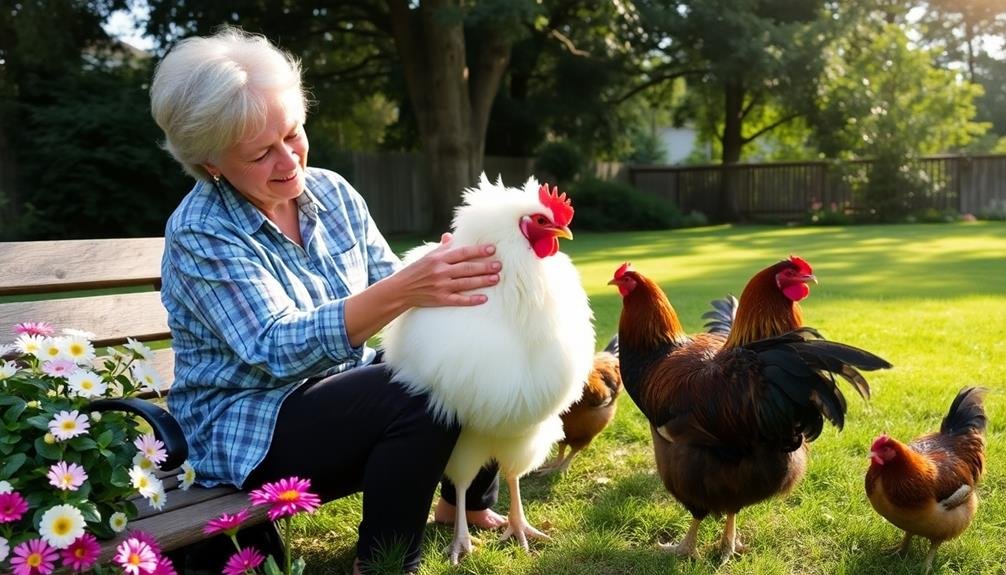

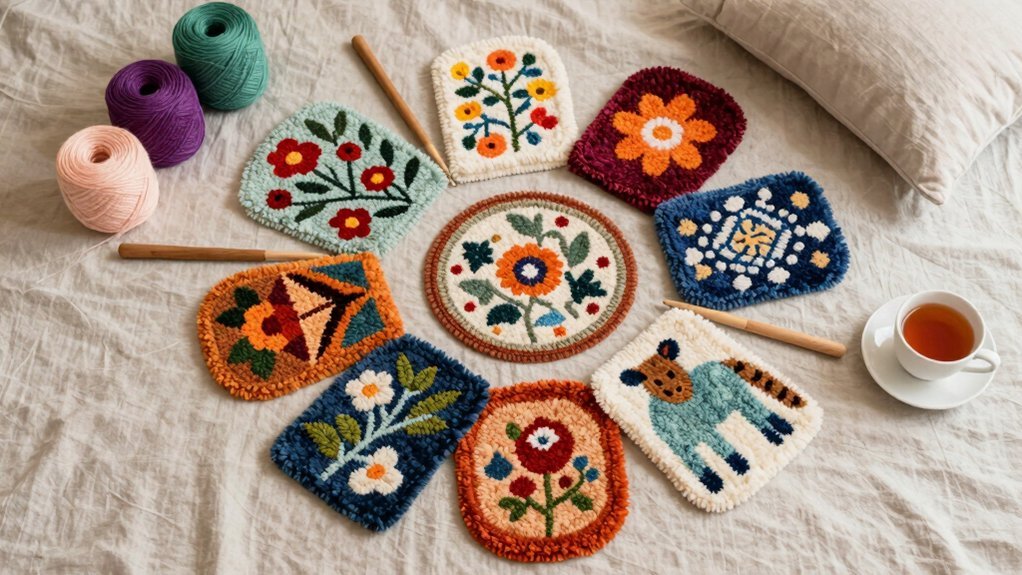
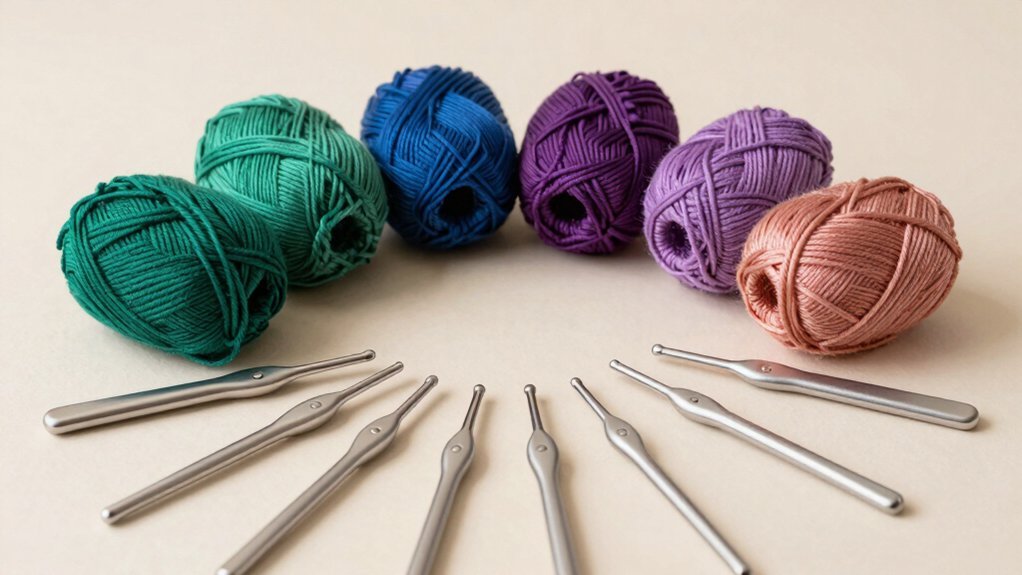
Leave a Reply